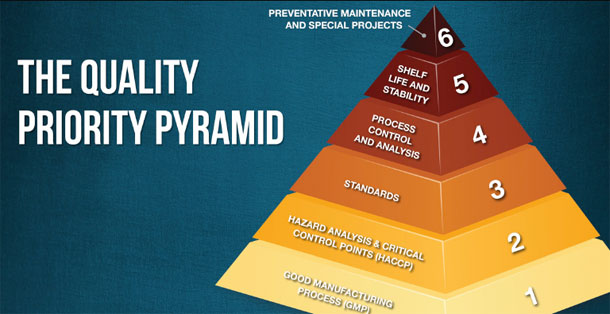MONDAY BEER LINKS, MUSING 05.25.15
Cult breweries go global.
There’s this question from Joe Stange: “So, is BrewDog — which has branded itself ‘punk’ from the start — becoming the ‘McDonald’s of craft beer’?” and he quotes Tim Webb thusly, “Clever beer has outgrown its infancy and is becoming an attitudinally challenged adolescent.” A nice turn of phrase and I enjoy many of the beers I’m pretty sure Webb is talking about, but I’m still trying to decide how clever I want my beers. [Via DRAFT]
‘Craft’ beer’s pandemic of quality un-control?
Tom Cizauskas apologizes for “the breathless Buzzfeedy-ness of the title” of the post, but wants you to read it. In it he revisits the concern that when Brewers Association director Paul Gatza called out some brewers about the quality of beer he drank at a particular festival that it “could easily be read as an attack by big ‘craft’ on small ‘craft.'” A BA subcommittee since created the pyramid shown here (Gatza included it during the “state of the industry” presentation at the recent Craft Brewers Conference and it appeared in New Brewer, the publication for BA members earlier this year).

The pyramid reflects things that Alastair Pringle has been telling decision makers at smaller breweries concerned with quality for the last several years. Pringle worked at Anheuser-Busch for 25 years before retiring in 2009. He teaches microbiology at a small college outside of St. Louis and consults with several relatively small breweries. He advocates a practical approach to beer quality — which could be focused on process improvement and control or beer flavor and stability — telling brewers to identify the major factors they can control. They don’t need to be using the same checklist as MillerCoors if they aren’t planning to ship their beer all over the universe.
“That’s usually seven or eight things, rather than making it very, very complicated,” Pringle says. When he worked at Anheuser-Busch, then CEO August Busch III famously demanded one-page solutions, so that people in production could easily implement them. “You didn’t get anywhere at A-B giving complicated talks where you looked clever.” And there’s that word again. [Via Yours For Good Fermentables]
CAMRA and Lager: Eurofizz or Pure Beer?
In its 44 years of existence, the Campaign for Real Ale has had a more complicated relationship with lager than cries of “fizzy piss” from some members might have you believe. Complicated, indeed, and a longish read worth saving to Pocket. [Via Boak & Bailey’s Beer Blog]
Twelve Years Spent A-Writing About Good Beer.
I’m stealing this from Alan McLeod for my business card: “My hobby is writing about beer. And it serves a purpose. It allows me to play out ideas related to standards touching on research, value, ethics, clarity and human weakness that I apply in my job and the rest of my life.” Except for the part about it being a hobby. Hobby and craft. Should we be talking about their relationship? [Via A Good Beer Blog}
Beer Money: How Industry Dollars Go to Work.
This is the first of eight posts from Bryan Roth (a series that is just wrapping up). He explains this goal is to “share a compilation of data sourced from public record for major beer companies and organizations who all play a role in shaping the politics of beer.” The series (links at the bottom of each post) examines both individual brewing companies and organizations. [Via This Is Why I’m Drunk]
Washington drought may threaten future of craft brewers.
Come down off the ledge. It isn’t quite that scary. In fact, “For the most part this year’s crop is okay, next year’s yet to be determined.” But down the road, less water, lower yields. [Via KOMONews]
Snake Charming and Herding Cats.
A day in the life of Tyler Nelson, who sells beer in Alabama, Georgia and South Carolina for Green Flash Brewing Company. [Via Beer Connoisseur]
You are kind, I am still scratching my head about the Webb statement. At +/- 35 years now, of this new beer movement (I just made that up as I typed this to replace micro/craft) I am not sure how adolescent it is. You have massive, wealthy and entrenched firms in the big beer category even with the newbie flood. It all may still be attitudinally challenged but this is a mature point on the narrative arc and one that largely mirrors similar points in beer innovation such as lager in the late 1890s.